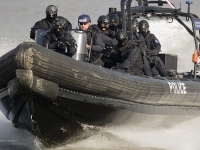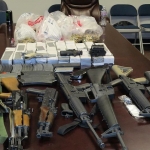United Nations, Olympics Accused of Using "Unaccountable" Private Security

Two global institutions - the United Nations and the Olympic Games - face charges that they are using "unaccountable and out of control" private security contractors. One of the companies at the heart of both controversies is G4S, a private security company in the UK.
Preparations for the Olympic Games in London later this month have been plunged into chaos because G4S failed to hire sufficient security while the U.N. has been alleged to have quietly been ramping up the use of such contractors in foreign missions including G4S.
G4S won a £284 million ($450 million) contract to provide 13,700 guards for the 2012 Olympics. A few days ago, the company was discovered to have only 4,000 in place.
Guards told the Guardian newspaper that they had been "offered shifts after they had failed G4S's own vetting."
One G4S trainee, an ex-policeman, described the hiring process to the Guardian as "an utter farce". "There were people who couldn't spell their own name. The staff were having to help them. Most people hadn't filled in their application forms correctly. Some didn't know what references were and others said they didn't have anyone who could act as a referee. The G4S people were having to prompt them, saying things like "what about your uncle?"
The guards who were hired "had received no schedules, uniforms or training on x-ray machines" just 14 days to go until the Olympics opening ceremony.
The Guardian newspaper also published a memo that G4S sent out Thursday to retired police. "G4S Policing Solutions are currently and urgently recruiting for extra support for the Olympics. These are immediate starts with this Tuesday, Wednesday, Thursday and Friday available. We require ex-police officers ideally with some level of security clearance and with a Security Industry Association [accreditation], however neither is compulsory."
The UK government is now making emergency preparations to deploy the British military if G4S cannot meet the requirements laid out in the contract.
Meanwhile G4S and its subsidiaries were revealed to have received $3 million in U.N. contracts in 2010 in "Dangerous Partnership: Private Military & Security Companies and the U.N." - a new report from Global Policy Forum (GPF), a New York think tank.
Other companies hired by the U.N. included Dyncorp and Saracen, according to GPF. Dyncorp of Virginia also recieved $3 million in U.N. contracts in 2010. (DynCorp became infamous for a sex trafficking scandal during the U.N. mission in Bosnia in the 1990s) Saraccen of South Africa was hired to support the Monusco peacekeeping mission in the Democratic Republic of Congo in 2010 and 2011.
GPF estimates that U.N. spending on private security companies went from at least $44 million in 2009 to $76 million in 2010, a 73 percent increase.
The U.N. Development Program spent $30 million of this amount. The U.N. peacekeeping program came second with $18.5 million while U.N. refugee programs spent and $12.2 million for private security contractors. This carries heavy risks, says GPF. "Armed security contractors can ... smuggle weapons into conflict zones and sell them or make them available to parties to the conflict, as has happened in Bosnia, Sierra Leone, Afghanistan and Somalia," the report warns.
The GPF report underlines the fact that the U.N. does not have an overview of which contractors it is using. "U.N. security officials themselves cannot give an estimate of total security contracting within the U.N. system or a complete list of companies hired. This suggests a system that is unaccountable and out of control," the report says.
The U.N. has defended its policies. "U.N. contracting policies have improved and we need to continue to improve them," Martin Nesirky, a U.N spokesman, told the Associated Press. "The distinct differences in the ways that private security contractors go about their work also must be borne in mind."
- 180 Media & Entertainment



